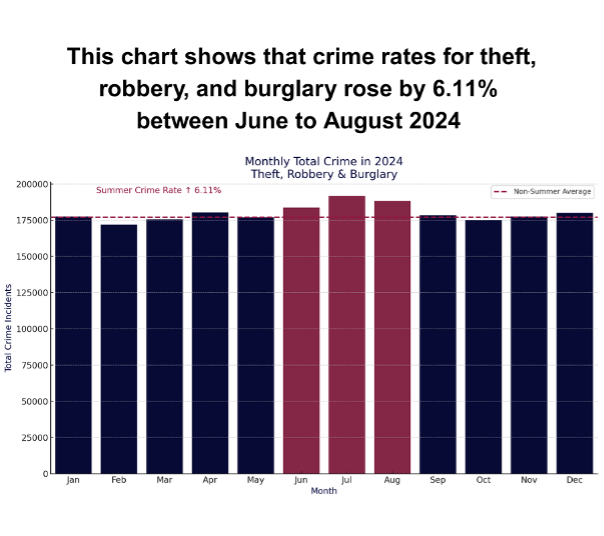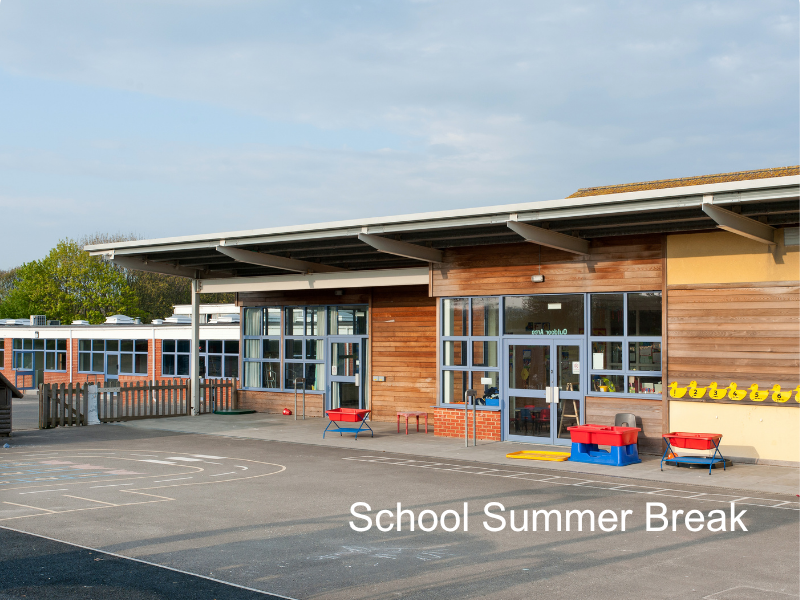
As the temperature rises and the days stretch out, summer brings with it a shift in routines – and in risk. From increased public activity to reduced staffing due to holidays, the summer months can create hidden vulnerabilities in your security setup.
The summer months present distinct challenges that can inadvertently compromise your organisation’s security. While the warmer weather and longer daylight hours may seem harmless, these seasonal changes can create hidden vulnerabilities.
During the summer, especially throughout the school holidays, there’s typically a significant increase in local footfall. Public areas, parks, and commercial premises tend to see more visitors — families, teenagers and tourists enjoying the outdoors. This heightened activity means greater visibility of your premises and potentially higher security risks, such as vandalism, petty theft, or opportunistic trespassing. Increased foot traffic can also mask suspicious behaviour, making it harder for security teams to quickly identify and respond to potential threats.
It might sound odd, but longer daylight hours can actually increase certain risks. Doors and windows are more likely to be left open for airflow – and more likely to be forgotten about at closing time. Sites also tend to be busier later into the evening, sometimes with fewer staff around. All of this creates opportunity for intruders or simply for things to be missed. A simple change in routine, or a regular mobile patrol, can make all the difference.
Understanding and addressing these unique summer factors through proactive planning — such as increased vigilance, professional security services, regular patrols, or technology-driven monitoring solutions is crucial in maintaining robust security throughout the season.

Source: GOV.UK Official Statistics – Historic police recorded crime and outcomes open data tables
At Magenta Security, we often see businesses caught off guard by seasonal changes. So here are a few things to keep in mind as we move into the warmer months.
With team members off enjoying a well-deserved break, it’s easy to overlook the impact on your security routines. Who’s locking up? Who’s responding if the alarm goes off? If your usual keyholders are away, it’s vital to have a reliable backup in place. This is where professional key holding and alarm response services can offer real peace of mind ensuring any incidents are handled quickly and safely, without putting pressure on your staff.
Summer is a prime time for many businesses especially those in retail, hospitality and facilities management — to bring on extra hands. While these short-term hires help operations run smoothly, they also introduce a unique security risk: unfamiliarity.
Unlike full-time staff, seasonal workers may not fully understand your site layout, protocols, or what constitutes suspicious behaviour. Without clear guidance, they might inadvertently leave access points unsecured, misplace keys, or overlook standard checks.
Even if someone’s only with you for a few weeks, a basic security briefing is essential. Here’s what to cover from day one:
Site orientation: Walk them through key areas, restricted zones, and emergency exits.
Access control: Explain who should be where — and when. Be clear on the use of ID badges, keys, or fobs, and stress the importance of not sharing credentials.
Incident response: Make sure they know how to report anything unusual, who to contact, and what to do in case of alarms or emergencies.
End-of-shift duties: Reinforce small but critical tasks, like locking up, checking equipment, and logging off systems.
Keep Oversight Tight
Assign a permanent staff member to shadow or supervise new temps for the first few shifts. Consider limiting their access to only the areas they need to work in. And don’t forget to revoke all access credentials promptly when their contract ends.
With just a bit of upfront planning, you can ensure temporary staff contribute positively — without weakening your security position.
If you manage a site that’s partially or fully closed during the summer – such as a school, university, or seasonal business – it’s important to adjust your security approach. Vacant buildings can be tempting targets for trespassing, fly-tipping or vandalism. Now’s the time to review your CCTV coverage, check your perimeter and consider additional checks or remote monitoring during quieter periods.
Sites near parks, schools or public footpaths often see more activity during the school holidays. This can mean more eyes on your premises – and potentially more risks. A quick visual inspection of your fencing, gates, and signage can help, as can reviewing whether security patrols or monitored CCTV might be worthwhile over the busier summer period.

Summer is the ideal season for property upgrades, maintenance work and infrastructure repairs. But with contractors, engineers, and tradespeople coming and going sometimes unsupervised — it’s easy for security to slip.
Unlike regular staff, contractors are often unfamiliar with your security setup, and may unintentionally leave doors open, prop gates, or allow tailgating (unauthorised individuals following them inside). In worst-case scenarios, poorly managed access can be exploited for theft, vandalism, or unauthorised surveillance.
Set Clear Access Boundaries
Before any contractor sets foot on site, make sure you’ve:
Supervision and Briefings Matter
Always brief contractors on basic security protocols before they begin work — especially around access points, alarms, and emergency procedures. For longer projects, consider assigning a staff liaison to oversee daily access, check that areas are secured after work and handle any unexpected issues.
After They Leave
Once the job is done, revoke any temporary access rights immediately. Do a quick audit of keys, fobs, or badges issued. And don’t forget to check that all physical entry points — doors, windows, gates — have been properly secured before the contractor team departs.
A few tight processes can go a long way toward keeping maintenance activity safe, controlled, and breach-free.
While the sun might be good for morale, it’s not always good for your security systems. Prolonged heat and direct sunlight can degrade the performance of electronic components —particularly CCTV cameras, access control units, alarm panels, and motion sensors. Left unchecked, high temperatures can cause systems to malfunction, lose calibration, or even shut down entirely.
This isn’t just an issue in extreme heatwaves. Even a few days of steady exposure can push sensitive hardware beyond its recommended operating range — especially if it’s mounted outdoors, in poorly ventilated rooms, or behind sun-facing windows.
Make Your Systems Summer-Ready: A Quick Heat-Check List
Taking steps now to prevent heat-related issues can help you avoid system downtime just when you need security to be at its most reliable.
It’s easy to assume your insurance has you covered no matter what — but in reality, most commercial policies come with strict conditions around security. And during the summer months when your site may be quieter, less staffed, or more exposed those conditions matter more than ever.
Why it’s critical: If a claim is made following a break-in, theft, or act of vandalism, your insurer will likely investigate whether agreed-upon security measures were in place at the time. If doors were left unlocked, alarms weren’t set, or access logs weren’t maintained, your payout could be delayed or denied entirely.
Stay Covered with a Summer Policy Review
Before peak season begins, it’s smart to sit down and go through your insurance documents, looking specifically for clauses related to:
Document Everything
If you make any security upgrades such as adding patrols, reinforcing access points, or improving lighting — keep records. This can strengthen your position in the event of a claim.
It’s also worth speaking with your broker or insurer to clarify any seasonal requirements. A 15-minute review now can save you thousands later — and ensure you’re not left exposed when you need support most.
Security doesn’t need to be complicated – it just needs to be well thought-out. A quick review now could prevent bigger problems later. At Magenta Security, we’re always happy to offer advice and support, whether it’s a one-off review, temporary placement or a full site security plan.
To find out how we can help you manage your security throughout the summer months call our friendly team on 0800 772 3786.